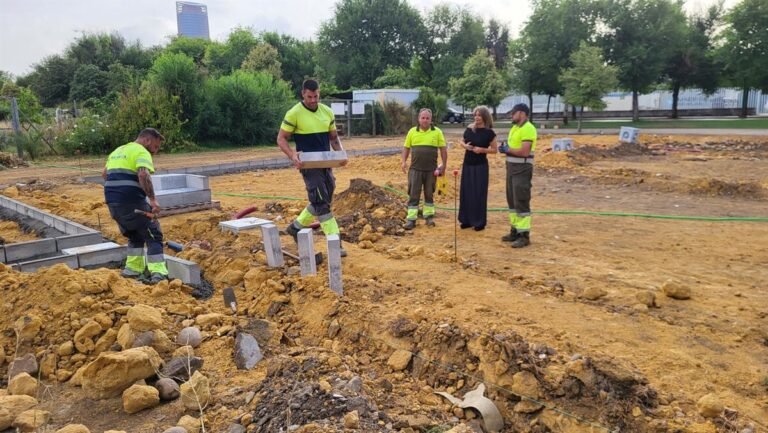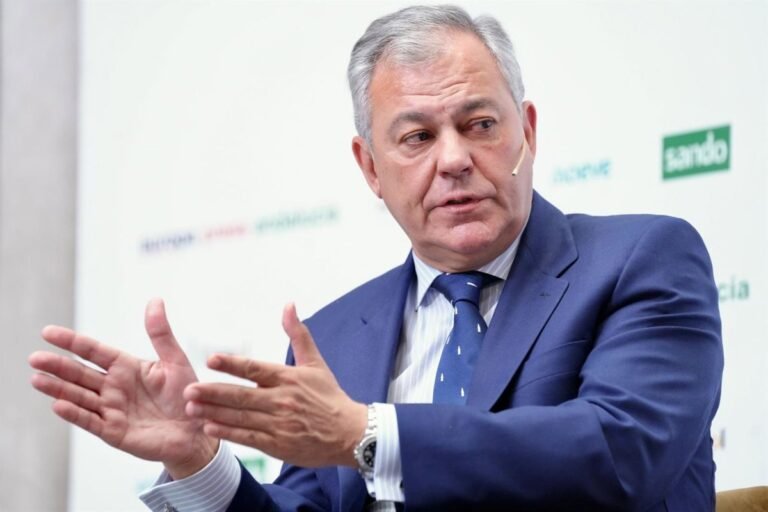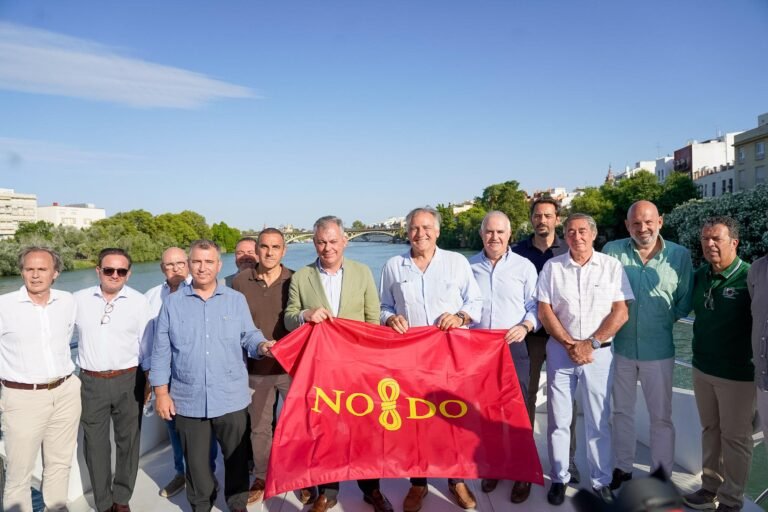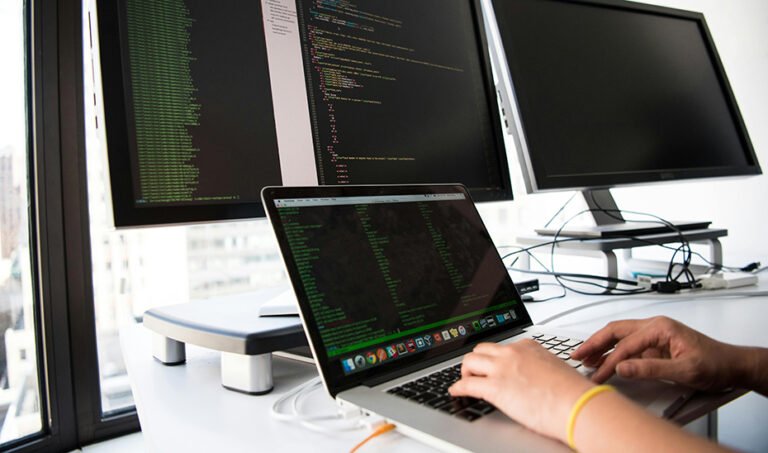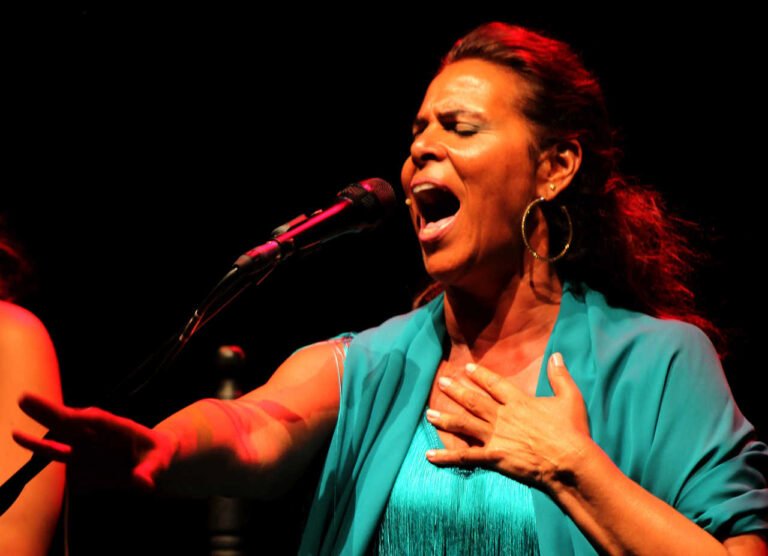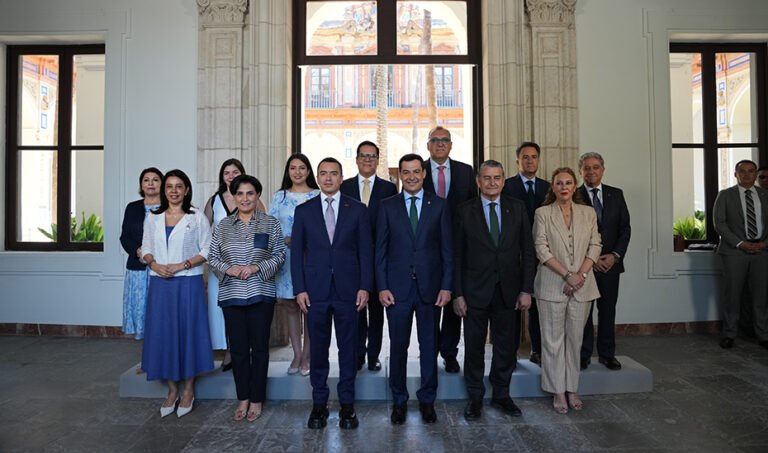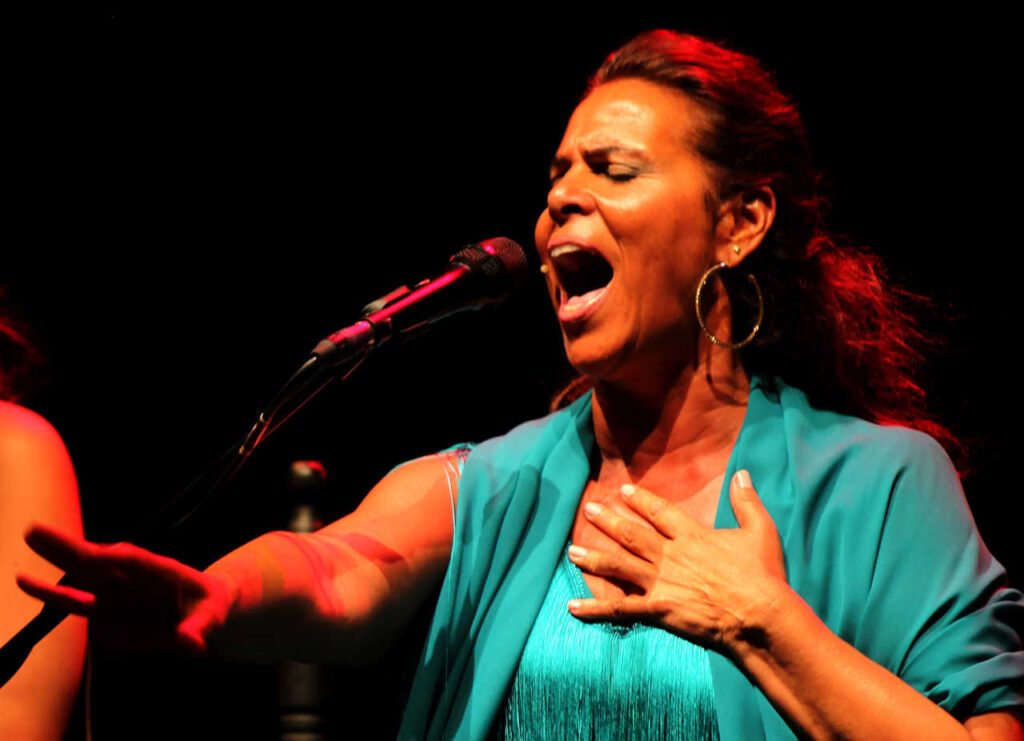
Seville, June 23, 2025.- The sixth of the AMALGAMA encounters, the series that with the collaboration of the Flamenco Biennial has been launched by the Seville City Council as part of the «Flamenco Promotion» program, under the title «Two shores of the song» will bring together on June 25th an indomitable voice, that of Aurora Vargas, alongside an innovative flamenco singer called Rosario La Tremendita. Both will have Manuel Curao, a flamenco journalist, as the host of the event, which will undoubtedly become another live radio program of the many that this communicator has done throughout his career on the airwaves.
This meeting promises an enriching dialogue between generations and styles, where Aurora will bring the purity of the deep tradition and La Tremendita the transgressive vision of current flamenco. With Curao’s mastery as a guide, a deep conversation is expected about the evolution of singing, oral transmission, and the challenges of modernity in this art. We are talking, therefore, about two shores, two perspectives: Seville and Triana and tradition and innovation. Undoubtedly, it will be a unique opportunity to experience the duende through anecdotes, reflections, and perhaps some spontaneous improvisation that illuminates the soul of flamenco.
Aurora Vargas (Seville, 1956) is one of the most personal, powerful, and respected voices in flamenco singing today. Coming from a gypsy family with deep roots in Seville and Cadiz, she embodies the essence of duende and authenticity in each of her verses. Her solid and extensive career has placed her as an essential figure on flamenco stages around the world.
Her beginnings were forged in emblematic tablaos such as «Los Canasteros» in Madrid and «Los Gallos» in Seville, fundamental schools where she acquired the solidity and knowledge of compás that characterize her. Her national breakthrough occurred in the mid-80s, standing out in key events such as the VI Flamenco Art Fortnight and her debut at the IV Flamenco Biennial of Seville, events that catapulted her to the major circuits.
The singing of Aurora Vargas has an unmistakable voice, full of strength, passion, and a touch that moves. While she excels notably in festive songs like tangos and bulerías, where her energy and rhythm are overwhelming, she also masters and delves into other flamenco styles with skill, demonstrating her versatility and knowledge of the traditional repertoire. Her ability to convey emotion and connect with the audience in live performances is one of her greatest virtues.
Throughout her career, she has taken her art throughout Spain and to numerous countries in Europe, America, and Asia, participating in top-level festivals and shows. Her talent has not gone unnoticed by the audiovisual world, collaborating in relevant film productions such as Carlos Saura’s movie «Flamenco» and Francesco Rosi’s adaptation of the opera Carmen. Although her discography is not extensive, it includes significant works like the album Acero Frío, reflecting the quality and authenticity of her singing.
Aurora Vargas has received numerous awards over the years, highlighting her artistic legacy and contribution to flamenco. She has been honored with distinctions such as the Medal of the City of Seville, a well-deserved tribute to a life dedicated with passion to her art and her city. Considered one of the great ladies of singing, she represents the wisdom of tradition, the power of expression, and the innate duende that only chosen voices of flamenco possess.
The avant-garde and the root in the evolution of female flamenco singing have a name: Rosario Guerrero, artistically known as Rosario La Tremendita (Triana, Seville, 1984), a key figure in the current avant-garde of flamenco singing. Descendant of a prominent flamenco lineage, with direct ancestry from La Tremenda, she has managed to combine deep respect for tradition with bold sound exploration, becoming one of the most innovative and complete artists in the flamenco scene.
From her origins in the Triana neighborhood, La Tremendita showed an artistic restlessness that took her beyond vocal interpretation. She is a singer, but also a composer, producer, lyricist, and multi-instrumentalist, proficiently handling the guitar, electric bass, and percussion. This comprehensive training allows her to approach flamenco from a global perspective, building unique sound proposals that push the genre’s boundaries.
Her style is characterized by experimentation and fusion, integrating elements from contemporary music without losing the essence and depth of traditional singing. La Tremendita moves naturally between the purity of flamenco styles and unexpected sound textures, creating her own language that revitalizes flamenco and projects it into the future. Her live performances are a showcase of her energy, creativity, and ability to connect with the audience through a personal and daring artistic proposal.
Throughout her career, she has developed significant and acclaimed discographic projects. Albums like Fatum, Delirium Tremens, and the double Tremenda. Principle and Origin are milestones in her discography, praised by critics for their originality and artistic quality.
Her innovative proposal has not only been applauded by specialized critics but has also received important international recognition. She has been nominated twice for the prestigious Latin Grammy Awards in the Best Flamenco Album category, a milestone that underscores the relevance and impact of her work on the global music scene. Considered a protagonist of one of the latest revolutions in deep singing, she represents the courage of contemporary creation from knowledge and respect for the roots. Her figure is key to understanding the current evolution of flamenco and its ability to dialogue with other artistic and aesthetic forms of the 21st century.
Both will have the opportunity once again to be interviewed by Manuel Curao, the voice of Flamenco on Andalusian Public Radio.
With nearly forty years dedicated to journalism and an indissoluble connection with radio waves, he stands as a key figure in the dissemination and knowledge of flamenco through Canal Sur Radio. His extensive career has made him a reference voice for fans and artists, playing a fundamental role in the preservation and dissemination of this universal art.
Originally from Los Palacios y Villafranca (Seville), he has spent most of his professional career at the Andalusian public radio station since its founding. From the beginning of Canal Sur Radio, he has led various programs dedicated to flamenco, imprinting a personal hallmark characterized by rigor, deep knowledge of the genre, and a contagious passion for flamenco art. Programs like «Quédate con el cante» or the current «Portal Flamenco» have become essential appointments to follow the flamenco news, get to know its protagonists, and delve into its different styles and expressions.
He defines himself as a «flamenco communicator,» focused on dissemination with judgment. His work involves a constant presence at major flamenco festivals and events, covering events of relevance such as the Flamenco Biennial or the International Cante de las Minas Festival in La Unión, where he has been a recognized and respected figure for decades. His closeness to the artists and his ability to generate an engaging and deep dialogue on the microphone have allowed him to bring the reality of flamenco to thousands of listeners.
Curao’s commitment to flamenco has been recognized with important awards throughout his career. Among them, the ‘Pencho Cros’ award for Journalism at the Cante de las Minas Festival stands out, a recognition of his continued support and dissemination of this event. He has also received the Musa Flamenca and an honorary Giraldillo from the Flamenco Biennial, distinctions that endorse his exceptional contribution to specialized flamenco journalism.
Concluding his professional career in public radio, Manuel Curao leaves an immense legacy in flamenco broadcasting. His thousands of broadcasting hours and tireless dedication have been essential for flamenco to occupy a relevant space on the airwaves, bringing its richness and diversity to successive generations. His voice will be forever associated with the soundtrack of flamenco in Andalusia.
With this meeting, the first phase of the AMALGAMA encounters comes to a close. The next ones will take place in the months of September, October, and November of this year. They will feature names such as: Pepe Lamarca, Remedios Malvárez, Fernando Iwasaki, Manuela Carrasco, Manuela Amador, Manuel Martín Martín, Merche Esmeralda, Leonor Leal, Leo Sardiña, Blanca del Rey, Patricia Guerrero, Olga Baeza, Rafael Riqueni, Alejandro Hurtado, Alberto García Reyes, José de la Tomasa, Manuel de la Tomasa, Andrés Marín, and Luis Ybarra, the current director of the Flamenco Biennial.

